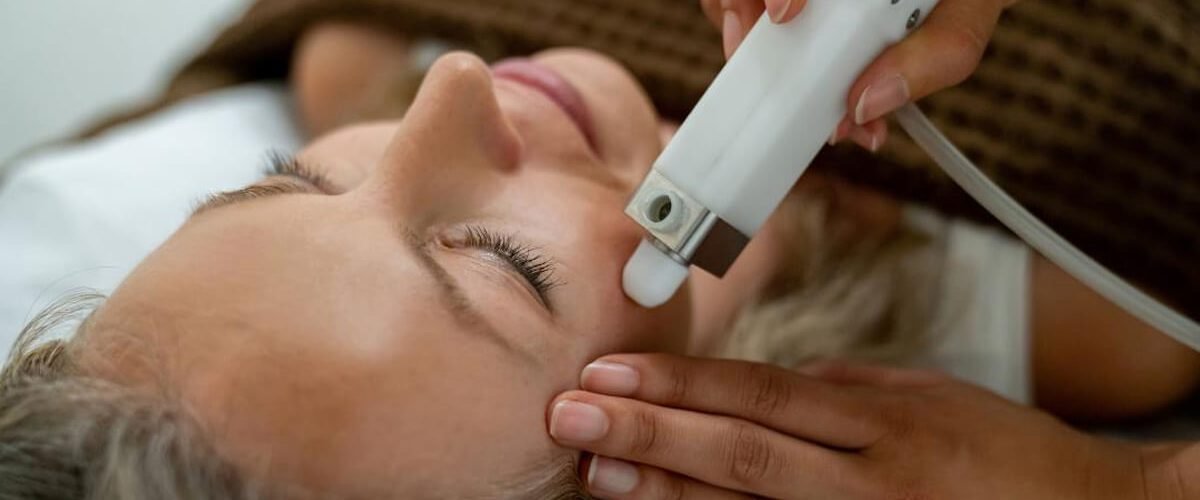Your face is the first thing people will see, and having dark spots on your face can be very embarrassing. Several conditions can cause dark spots, ranging from melasma to tattoo inks. Luckily, you can have beautiful skin with no dark spots with the right treatments.
Table of Contents
Causes Of Dark Spots
1. Melasma
Melasma is a hyperpigmentation of the face caused by estrogen levels that are too high. It affects women more than men, and it may be triggered by hormonal changes, such as the ones brought about by puberty, pregnancy, and menopause. It is also more common in fair-skinned people but can appear in anyone. It occurs most commonly on the face but can occur anywhere on the body that has had sun exposure.
2. Sun damage
This is the most common cause of dark spots. Over time, exposure to sunlight can cause freckles, age spots, or even skin cancer. When the skin is exposed to UV rays from the sun, it creates free radicals that break down the DNA in your skin cells. This damage accumulates over time and will cause dark patches to occur on your face and hands.
3. Acne
Usually, acne starts when a pore gets clogged up with oil, dead skin, and bacteria. This causes the pore to swell up, resulting in an inflammatory reaction and leaving a dark spot on your face. The best way to avoid acne and reduce the risk of dark spots is to keep your skin clean, wash your face twice a day and keep it moisturized.
4. Pigmentary deposits
This occurs when melanocytes produce too much melanin. This causes them to be born with brown spots or freckles in some people. Over time, these pigments can increase in size and cause dark spots to appear on your skin. Pigmentary deposits can also lead to hyperpigmentation, where the dark spots appear after sun exposure.
5. Medication side effects
Skin is not immune to medication side effects, and sometimes the medications used for other conditions can cause dark spots. The most common medication that causes this is Isotretinoin, which is used for acne treatment. Other medicines that can have side effects on your skin include birth control pills, antimalarial drugs, and atypical antipsychotics.
6. Diabetes
This condition causes the body not to produce enough insulin or produce too much insulin. This can lead to dark spots on the skin or even birthmarks and freckles.
7. Irritation
This can be caused by several factors, including excessive sweating, scratching or pressure to the skin, lupus erythematosus, dermatitis, and fungal infection.
8. Wound healing
When the body is healing after an injury, it increases melanin production to promote angiogenesis. When the skin is fully healed, the melanin settles, and this can cause dark spots to appear on the skin.
How to remove dark spots
1. Chemical peels
These are mild treatments that are generally used to remove minor skin discolorations. They begin by applying a chemical that has been specially formulated for your skin type, like phenol. Then, the doctor will start peeling at an even rate by working on different areas of your face. The doctor will repeat this process a few times until you have had enough peeling, and then they will even out the peel to give you a uniform look.
2. IPL treatment
This is another type of chemical peel that uses a laser to break up the dark spots on your skin, leaving you with a smoother skin tone. It is safe and effective for removing dark spots, but it takes at least four treatments. After all the peeling has taken place, the doctor will use a special blue light for 5-6 minutes after the first treatment to help remove any extra pigment in your skin and prevent more dark spots from appearing.
3. Microdermabrasion
This treatment uses a fine stream of aluminum oxide crystals to remove the outer layer of your skin. This leaves your skin smoother and fresher looking. The crystals are usually moved over your face at high speed, which helps reduce the appearance of acne scars, hyper-pigmentation, and wrinkles. The crystals can be left on for longer to help promote collagen production and turn back the clock for your skin.
4. Laser resurfacing
This uses a laser to target your dark spots and remove their pigment. The doctor will also use a laser to treat wrinkles, like a facelift, without the need for surgery. After the treatment, you should avoid the sun for about two weeks so that your skin can completely recover and repigment.
5. Prescription skin-lightening cream
There are many different creams on the market approved by the FDA to help lighten dark scars. These include hydroquinone, kojic acid, and retinoids, reducing dark spots. You will need to apply these creams daily and sunscreen when you go outside.
6. Injectable fillers
These are a safe way to get rid of dark spots on your face if they are not too severe. The doctor will inject the filler into your skin, which helps minimize the appearance of dark spots. The filler can also help to improve wrinkles, giving you a younger-looking face.
7. Cryotherapy
Cryotherapy uses liquid nitrogen to freeze the dark spots on your face. Cryotherapy is known to work well for freckles and pigmented moles. The freezing will cause a blistering or peeling of the skin in most cases, but this will leave you with a lighter skin tone. You may need more than one treatment to achieve the desired result, and it can take up to eight weeks for your skin tone to return to normal.
8. Dermatological peels
In this method, a strong chemical or combination of different chemicals is applied topically to the skin. It may be applied to the affected area only or to cover a larger area. The active ingredients can be selected specifically for your particular skin type and condition. The doctor will then leave the peel on your skin for a few minutes before removing it with cool water. This process is repeated until you have achieved the desired level of peeling, and then the doctor will apply a soothing cream on your face afterward.
In conclusion, dark spots are common and can affect anyone at any age. While many factors can lead to dark spots, the most important thing is to prevent them from appearing on your skin. This means that you need good skincare by following a healthy diet, avoiding the sun, wearing sunscreen regularly, and using creams with SPF protection like zinc oxide or titanium dioxide.





